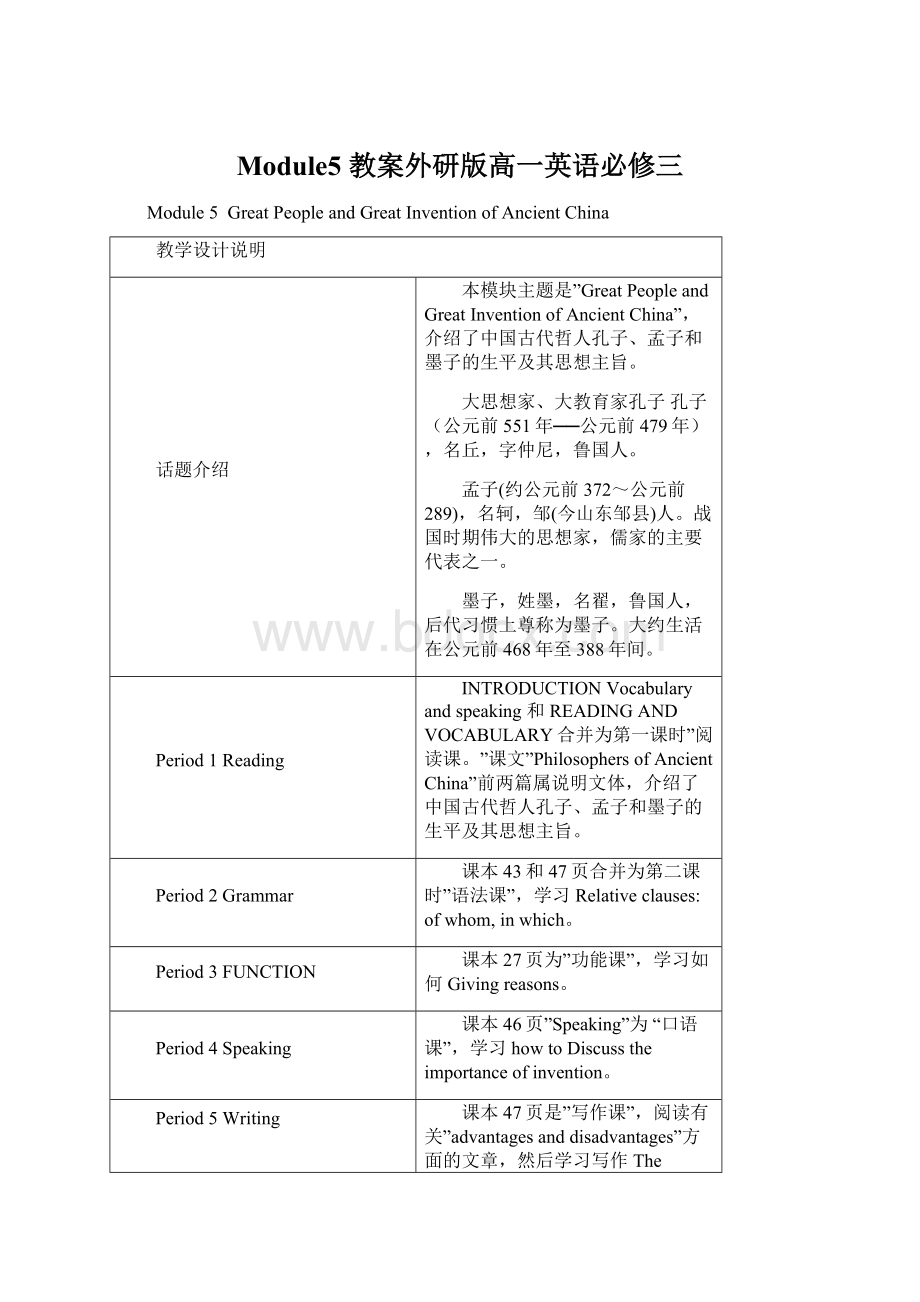 Module5 教案外研版高一英语必修三.docx
Module5 教案外研版高一英语必修三.docx
- 文档编号:4703511
- 上传时间:2022-12-07
- 格式:DOCX
- 页数:22
- 大小:90.69KB
Module5 教案外研版高一英语必修三.docx
《Module5 教案外研版高一英语必修三.docx》由会员分享,可在线阅读,更多相关《Module5 教案外研版高一英语必修三.docx(22页珍藏版)》请在冰豆网上搜索。

Module5教案外研版高一英语必修三
Module5GreatPeopleandGreatInventionofAncientChina
教学设计说明
话题介绍
本模块主题是”GreatPeopleandGreatInventionofAncientChina”,介绍了中国古代哲人孔子、孟子和墨子的生平及其思想主旨。
大思想家、大教育家孔子孔子(公元前551年──公元前479年),名丘,字仲尼,鲁国人。
孟子(约公元前372~公元前289),名轲,邹(今山东邹县)人。
战国时期伟大的思想家,儒家的主要代表之一。
墨子,姓墨,名翟,鲁国人,后代习惯上尊称为墨子。
大约生活在公元前468年至388年间。
Period1Reading
INTRODUCTIONVocabularyandspeaking和READINGANDVOCABULARY合并为第一课时”阅读课。
”课文”PhilosophersofAncientChina”前两篇属说明文体,介绍了中国古代哲人孔子、孟子和墨子的生平及其思想主旨。
Period2Grammar
课本43和47页合并为第二课时”语法课”,学习Relativeclauses:
ofwhom,inwhich。
Period3FUNCTION
课本27页为”功能课”,学习如何Givingreasons。
Period4Speaking
课本46页”Speaking”为“口语课”,学习howtoDiscusstheimportanceofinvention。
Period5Writing
课本47页是”写作课”,阅读有关”advantagesanddisadvantages”方面的文章,然后学习写作Theadvantagesanddisadvantagesoftelevision。
Period6CULTURALCORNER
课本49页的CULTURECORNER是”文化阅读课”,TheIndustrialRevolution,介绍了工业革命,又称产业革命。
工业革命指资本主义工业化的早期历程,即资本主义生产完成了从工场手工业向机器大工业过渡的阶段。
是以机器取代人力,以大规模工厂化生产取代个体工场手工生产的一场生产与科技革命。
Period7TASK
课本50页的TASK是”任务课”,学习用英文WritingaboutafamouspersonfromancientChina。
PartOneTeachingDesign
第一部分教学设计
Period1Reading—PhilosophersofAncientChina
■Goals
●TolearntoreadpassageswithdefiningrelativeclausesaboutPhilosophersofAncientChina
Tolearntoreadwithstrategies
■Procedures
Step1:
Warmingupbydefiningphilosopher
Aphilosopherisapersondevotedtostudyingandproducingresultsinphilosophy.Theword,“philosopher,”literallymeans“loverofwisdom.”
WarmingupbydiscussingsomephilosophicalsentencesfromtheAnalectsofConfucius
子曰:
“学而时习之,不亦说乎?
有朋自远方来,不亦乐乎?
人不知而不愠,不亦君子乎?
”
TheMastersaid:
“Isitnotpleasanttolearnwithaconstantperseverance([]坚定不移)andapplication?
Isitnotdelightfultohavefriendscomingfromdistantquarters?
Ishenotamanofcompletevirtue,whofeelsnodiscomposure([]心乱,狼狈,不安)thoughmenmaytakenonoteofhim?
”
子曰:
“温故而知新,可以为师矣。
”
TheMastersaid:
“Ifamankeepscherishing([]怀念;怀有(感情);抱有(希望))hisoldknowledge,soascontinuallytobeacquiringnew,hemaybeateacherofothers.”
知之为知之,不知为不知。
Whenyouknowathing,toholdthatyouknowit;andwhenyoudonotknowathing,toallowthatyoudonotknowit.
子曰:
“学而不思则罔,思而不学则殆。
”
TheMastersaid,“Learningwithoutthoughtislaborlost;thoughtwithoutlearningisperilous([]危险的).”
WarmingupbylearningaboutConfucianism
Scholarlytraditionandwayoflifepropagated([]繁殖,传播,宣传)byConfuciusinthe6th–5thcenturyBCandfollowedbytheChineseformorethantwomillennia([]太平盛世,千年)(millennium的复数).Thoughnotorganizedasareligion,ithasdeeplyinfluencedEastAsianspiritualandpoliticallifeinacomparablemanner.Thecoreideaisren(“humaneness([]),”“benevolence([])”),signifyingexcellentcharacterinaccordwithli(ritualnorms),zhong(loyaltytoone'struenature),shu(reciprocity([]互惠)),andxiao(filialpiety).Togethertheseconstitutede(virtue).Mencius,Xunzi,andotherssustainedConfucianism,butitwasnotinfluentialuntilDongZhongshuemergedinthe2ndcenturyBC.ConfucianismwasthenrecognizedastheHanstatecult([]礼拜,祭仪,一群信徒,礼拜式),andtheFiveClassicsbecamethecoreofeducation.InspiteoftheinfluenceofDaoismandBuddhism,ConfucianethicshavehadthestrongestinfluenceonthemoralfabricofChinesesociety.ArevivalofConfucianthoughtinthe11thcenturyproducedNeo-Confucianism,amajorinfluenceinKoreaduringtheChosondynasty(朝鲜王朝 (1392~1910))andinJapanduringtheTokugawa([]德川(创建日本德川幕府的德川家族))period.
Step2:
Beforeyouread
Pleasegooverthewordlistforthismodule,payingattentiontothepronunciationoftheword,therelationshipbetweenitspronunciationanditsspelling.
Step3:
Whileyouread
1.TypeofwritingandsummariesofPhilosophersofAncientChina
PhilosophersofAncientChina
(anexpositionwriting)
Confucius
Mencius
Mozi
Confucius(551BC-479BC)isthephilosopherwhoseinfluencehasbeenthegreatest.
MenciuswasathinkerwhoseteachingswereverysimilartothatofConfucius.
Moziwasanotherteacherwhowasveryinfluential.
2.AdiagramofSandstormsinAsia
3.Completethearticlewithonewordineachblank
InancientChinastateswereoftenat_1_witheachother.ButancientChinahasalsoproducedmanygreatphilosophers.Confuciusstressedthe_2_ofkindness,dutyandorderinsociety.Chinesesocietywasinfluencedbythese_3_formorethan2,000years.Menciuswasathinkerwhoseteachingswereverysimilarto_4_ofConfucius.Menciusbelievedthatthereasonwhymanisdifferentfromanimalsisthatmanis_5_.Hetaughtthatifthegovernmentwaskind,thenpeoplewouldbegood.Hebelievedthatpeople_6_moreimportantthanrulers,andhatedthestatewhenittreatedpeoplebadly.Mozifoundedthe_7_calledMohism.Insomeways,hisbeliefsweresimilartothoseofConfucius.Mozi_8_thatallmenwereequal.Hehatedtheideaofwar.
Keys:
1war2importance3ideas4that
5good6were7philosophy8believed
4.Answerthereadingcomprehensionquestionsaccordingtothetext
1._____(551BC-479BC)isthephilosopherwhoseinfluencehasbeenthegreatest.
A.MenciusB.MoziC.ConfuciusD.Laozi
2._____wasathinkerwhoseteachingswereverysimilartothatof_____.
A.Confucius,LaoziB.Mencius,ConfuciusC.Mencius,MoziD.Mozi,Confucius
3.WhydidMenciusresign?
A.Becausetherulerwasnotfollowinghisadvice.
B.BecausehewaspreparingabookofhisteachingscalledTheBookofMencius.
C.Becausehebecameanadvisertoanotherruler.
D.Becausehehatedthestate.
4.Mozibecamefamousfor_____hisunusualclothesandbehaviour.
A.hisoldageB.hisunusualclothesandbehaviourC.MohismD.behaviour
Keys:
1-4CBAB
Step4:
Afteryouread
1.CopyalltheusefulexpressionsintoyourExpressionBook.Ifpossible,makeyourownsentenceswiththeseexpressions.
UsefulexpressionsfromPhilosophersofAncientChina
ancientChina,atwarwith…,stresstheimportanceof…,insociety,formorethan2,000years,beverysimilarto…,bebornin,bebroughtupby…,Confucius’ideas,begivenanimportantposition,inthegovernmentofastate,followone’sadvice,teachtheprinciplesof…,spendone’slastyearspreparingabookofone’steachings,treatpeoplebadly,comefromafamilyof,unusualclothesandbehavior,findthephilosophy,insomeways,one’sideaoflove,lookafter
SentencesmadewithexpressionsfromModule5
1.1.AncientChinaisagreatcountry.
2.2.JapanwasatwarwithChinathen.
3.3.MyteacherstressestheimportanceofreadingaloudinlearningEnglish.
4.4.Therearealwayssomethingsbadinsociety.
5.5.Formorethan2,000yearsthiscountrywasruledunderaforeignruler.
6.6.Paulisverysimilarinappearancetohisbrother.
7.7.Hewasbornin500BC.
8.8.Shewasbroughtupbyhergrandmother.
9.9.Confucius’ideasareusefultoChina’spresentdevelopment.
10.10.Hewantstobegivenanimportantpositionintheschool.
11.11.Therearesomegoodworkersinthegovernmentofthisstate.
12.12.Ifyoufollowmyadvice,youwillbesuccessfulinyourEnglishlearning.
13.13.Mr.Wangteachestheprinciplesofgoverninganation.
14.14.Ispentanhouratthestationwaitingforthetrain.
15.15.Thegovernmenttreatsitspeoplebadly.
16.16.Hecamefromafamilyofeightpeople.
17.17.Hisunusualclothesandbehaviormadeitdifficultforhimtogetmarried.
18.18.WefindthephilosophyoftheEastisinsomewayssimilartothatoftheWest.
19.19.Ibelieveinhisideaoflove.
20.20.Lookafteryourselfwhileyou’reaway.
2.Readtotransferinformation
Youarenexttodrawadiagramofthetext.Youmayretellthetextwiththehelpofthediagram.
Para.1Confucius
(551BC-479BC)isthephilosopherwhoseinfluencehasbeenthegreatest.
Para.2
Mencius(bornin372BC)wasathinkerwhoseteachingswereverysimilartothatofConfucius.
Para.3
Mozi(bornin476BC)wasanotherteacherwhowasveryinfluential.
Period2Grammar-Definingrelativeclauses
■Goals
●Tolearnaboutdefiningrelativeclauses
■Procedures
Step1:
Understandingrelativeclause
Asubordinateclausewhichisintroducedbyarelativepronounisoftenreferredtoasarelativeclause.
Definingrelativeclauses
Whenarelativeclausehasthefunctionofdefiningoridentifyingtheobjectbeingreferredto,theclauseisnotplacedbetweencommas.Suchaclausecanbecalledadefiningorlimitingrelativeclause.(限定性定语从句一般紧跟在先行词的后面修饰、限定先行词,它与先行词之间没有逗号,去掉后会影响全句意思的完整性。
)
Step2:
Givingexamplesofrelativeclauses
Thepeoplethatwerehereyesterdaywillreturninamonth.
Thenewspaperthatwasonthestepsbelongstoourneighbor.
Thebooks(that)weboughtareheavy.
Thetown(that)thisroadleadstoisfivemilesaway.
Thesuitcasewhichwepurchasedlastweekisverystrong.
Thechildwhorunsthefastestwillreceiveaprize.
Theboywhomwevisitedishernephew.
Thegirltowhomyousoldyourskislivesinthenextblock.
Thewomanwhosehousewassoldwillretiretothecountry.
Theboy(whom)/(that)wesawisherbrother.
Thehat(which)/(that)youarewearingisratherlarge.
Theboytowhomwesentthemessagewasexcited.
Theroomtowhichyouwillbeconductedhasbeautifulfurniture.
Theroomthatyouwillbeconductedtohasbeautifulfurniture.
Resources
1.Studentsmaywanttoknowmoreclearlyabouttheusageofrelativepronouns.Atablecanbeusedtoexplainasbelow:
Relativepronounsusedinattributiveclauses
Antecedent
Subject
Object
Possessive
Note
persons
who/that
whom/who/that
whose
A
- 配套讲稿:
如PPT文件的首页显示word图标,表示该PPT已包含配套word讲稿。双击word图标可打开word文档。
- 特殊限制:
部分文档作品中含有的国旗、国徽等图片,仅作为作品整体效果示例展示,禁止商用。设计者仅对作品中独创性部分享有著作权。
- 关 键 词:
- Module5 教案外研版高一英语必修三 教案 外研版高一 英语 必修
 冰豆网所有资源均是用户自行上传分享,仅供网友学习交流,未经上传用户书面授权,请勿作他用。
冰豆网所有资源均是用户自行上传分享,仅供网友学习交流,未经上传用户书面授权,请勿作他用。


 广东省普通高中学业水平考试数学科考试大纲Word文档下载推荐.docx
广东省普通高中学业水平考试数学科考试大纲Word文档下载推荐.docx
